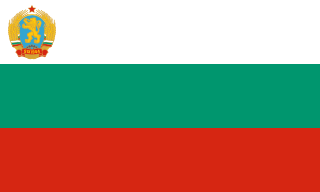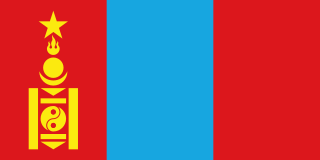
The 1904 Summer Olympics were an international multi-sport event held in St. Louis, Missouri, United States, from 29 August to 3 September 1904, as part of an extended sports program lasting from 1 July to 23 November 1904, located at what is now known as Francis Olympic Field on the campus of Washington University in St. Louis. The 1904 Summer Olympics were the first time the Olympic Games were held outside Europe.

Bulgaria competed at the 1964 Summer Olympics in Tokyo, Japan. 63 competitors, 56 men and 7 women, took part in 56 events in 9 sports.

Bulgaria competed at the 1960 Summer Olympics in Rome, Italy. 98 competitors, 89 men and 9 women, took part in 66 events in 12 sports.

Canada competed at the 1920 Summer Olympics in Antwerp, Belgium. 52 competitors, all men, took part in 38 events in 9 sports. These games marked the introduction of winter sports to the Olympic program ; Canada won its first gold medal for ice hockey.

Yugoslavia competed at the 1984 Summer Olympics in Los Angeles, United States which took place from 29 July to 12 August 1984. Yugoslav athletes had competed in every Summer Olympic Games since their official debut in 1920. The Yugoslav Olympic Committee (JOK) sent a delegation of 139 athletes, 105 men and 34 women, competing in 16 sports, down from 164 competitors in 1980. Due to the Soviet-led boycott, Yugoslavia was one of only three Communist countries to take part at the Games, along with China and Romania.
The freestyle middleweight was one of five freestyle wrestling weight classes contested on the Wrestling at the 1908 Summer Olympics programme. Like all other wrestling events, it was open only to men. The middleweight was the second-heaviest weight class, allowing wrestlers of up to 73 kilograms (161 lb). Each nation could enter up to 12 wrestlers.
At the 1920 Summer Olympics, ten wrestling events were contested, for all men. There were five weight classes in Greco-Roman wrestling and five classes in Catch as Catch Can, predecessor to freestyle wrestling. The competitions were held from Monday, August 16 to Friday, August 20, 1920 (Greco-Roman) and from Wednesday, August 25 to Friday, August 27, 1920 (freestyle).

Finland competed at the 1920 Summer Olympics in Antwerp, Belgium for the first time as a fully independent state. It did compete at the previous Olympics, however, only as the Russian-dependent Grand Duchy of Finland. 63 competitors, 62 men and 1 woman, took part in 51 events in 9 sports.

Mongolia competed at the 1968 Summer Olympics in Mexico City, Mexico. 16 competitors, 12 men and 4 women, took part in 26 events in 4 sports.

Ivar Valentin Johansson was a Swedish wrestler who competed at the 1928, 1932 and 1936 Summer Olympics. In 1932 he won the gold medal in the Greco-Roman welterweight and freestyle middleweight events. Four years later he won the gold medal in the Greco-Roman middleweight competition.
The men's freestyle 82 kilograms at the 1996 Summer Olympics as part of the wrestling program were held at the Georgia World Congress Center from July 30 to July 31. The gold and silver medalists were determined by the final match of the main single-elimination bracket. The losers advanced to the repechage. These matches determined the bronze medalist for the event.
The men's Greco-Roman middleweight was a Greco-Roman wrestling event held as part of the Wrestling at the 1920 Summer Olympics programme. It was the third appearance of the event. Middleweight was the median category, including wrestlers weighing up to 75 kilograms.
The men's freestyle featherweight was a Catch as Catch Can wrestling, later freestyle, event held as part of the wrestling at the 1920 Summer Olympics programme. It was the third appearance of the event. Featherweight was the lightest category, and included wrestlers weighing up to 54 kilograms.
The men's freestyle lightweight was a Catch as Catch Can wrestling, later freestyle, event held as part of the wrestling at the 1920 Summer Olympics programme. It was the third appearance of the event. Lightweight was the second-lightest category, and included wrestlers weighing up to 61 kilograms.
The men's freestyle light heavyweight was a Catch as Catch Can wrestling, later freestyle, held as part of the Wrestling at the 1920 Summer Olympics programme. It was the first appearance of the weight class. Light heavyweight was the second-heaviest category, and included wrestlers weighing up to 80 kilograms.
The men's freestyle heavyweight was a Catch as Catch Can wrestling, later freestyle, event held as part of the wrestling at the 1920 Summer Olympics programme. It was the third appearance of the weight class. Heavyweight was the heaviest category, and included wrestlers weighing over 80 kilograms.
The men's freestyle middleweight was a freestyle wrestling event held as part of the Wrestling at the 1924 Summer Olympics programme. It was the third appearance of the event. Middleweight was the third-heaviest category, including wrestlers weighing from 72 to 79 kilograms.
The men's freestyle lightweight was a freestyle wrestling event held as part of the Wrestling at the 1928 Summer Olympics programme. It was the fifth appearance of the event. Lightweight was the third-lightest category, including wrestlers weighing up to 65 kilograms. Eino Leino won his third Olympic medal, a bronze to go with his 1920 middleweight gold and 1924 welterweight silver.
The men's freestyle middleweight was a freestyle wrestling event held as part of the Wrestling at the 1928 Summer Olympics programme. It was the fourth appearance of the event. Middleweight was the third-heaviest category, including wrestlers weighing up to 79 kilograms.
The Men's Freestyle middleweight at the 1968 Summer Olympics was part of the wrestling program were held at the Insurgentes Ice Rink from October 17 to October 20. The middleweight allowed wrestlers up to 87 kilograms.







